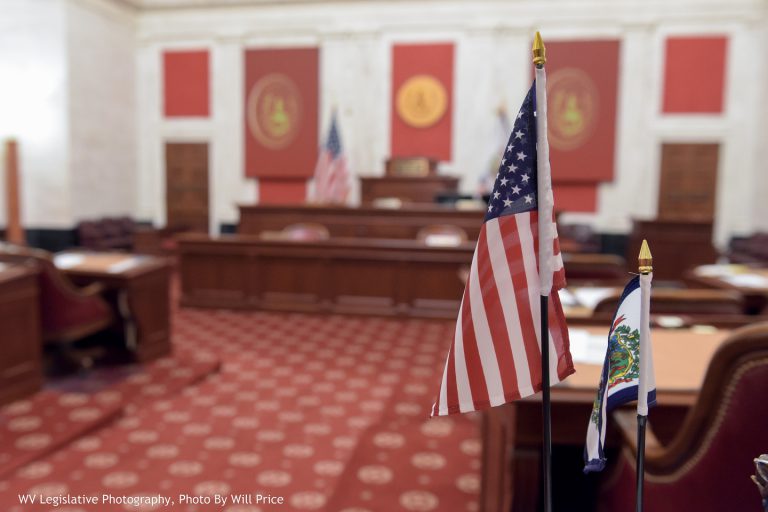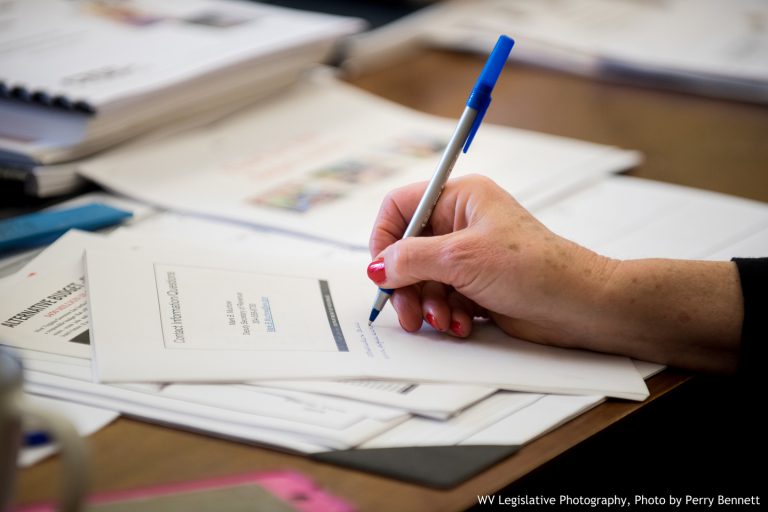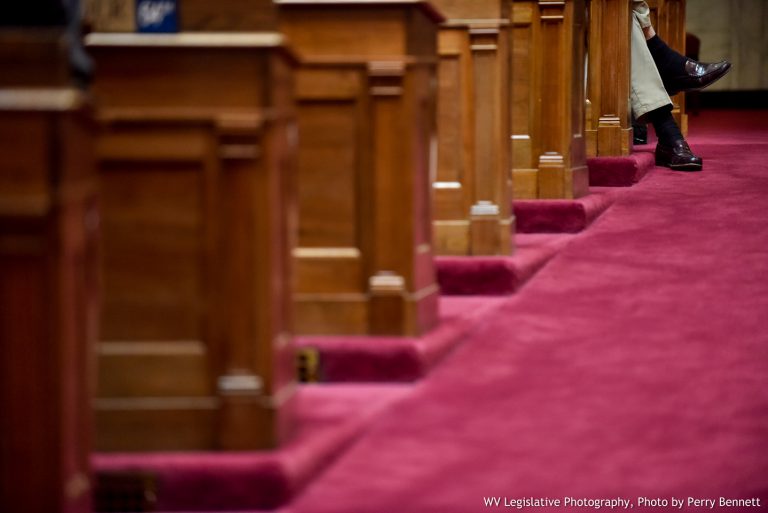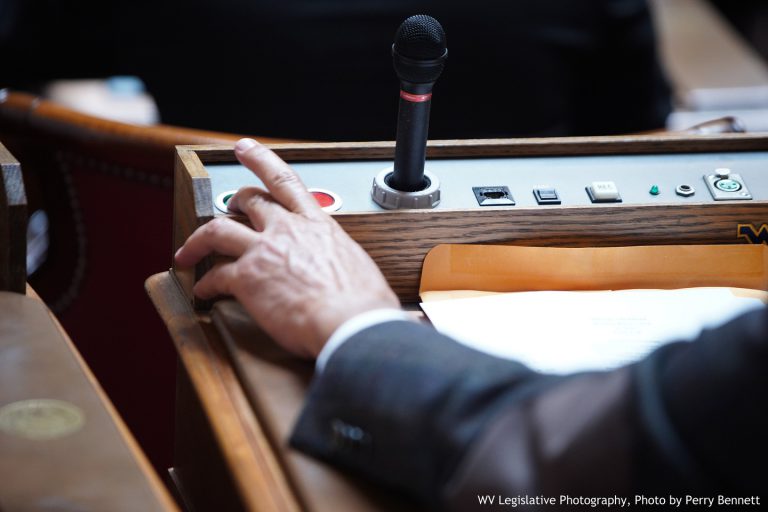In the House
As of 4 PM, Wednesday, March 3rd, 2004, the 50th day of the 2004 Regular Session, 1,371 bills have been introduced in the House of Delegates. Of those, the following bills have been passed by this body since February 25th and will go to the Senate for its consideration.
House Bill 2132 would provide retirement service credit to teachers at private colleges and universities. A teacher at a private college or university would be granted credit provided that the member pays to the system double the amount contributed during the first full year of current employment, times the number of years for which credit is granted, plus interest at a rate to be determined by the retirement board.
Committee Substitute for House Bill 2423 relates to the authorization of awarding high school diplomas to certain surviving veterans. The bill would award high school diplomas to veterans of World War I, World War II, the Korean Conflict and the Vietnam Conflict, provided that a veteran of the Korean Conflict or the Vietnam Conflict attended high school at the time he or she left prior to graduating and served in the armed forces of the United States.
Committee Substitute for House Bill 3004 would prohibit a person who is not the owner of a dog from removing tags, collars or apparel from a dog without the permission of the owner.
Committee Substitute for House Bill 4027 would establish a Voluntary Environmental Excellence Program and provide for incentives to those businesses that exceed minimum environmental law requirements. Those members who participate in the program would be eligible for certain benefits which may include more self-monitoring, regulatory flexibility and recognition of environmental leadership.
Committee Substitute for House Bill 4031 would increase the salaries of state Supreme Court justices, circuit court judges and family court judges. Committee Substitute for House Bill 4116 would provide tuition and fee vouchers for students who sound Taps during a military honors funeral. The bill would authorize the State Board of Education to create, distribute and provide general guidelines, contact information and technical assistance for the establishment of school level programs that encourage capable students in grades six through 12 to sound Taps. The sounding of Taps through this bill would be conducted on a standard or valved bugle, trumpet, cornet or flugelhorn during military honors funerals held in this state. Under this bill, the State Board would also distribute an appropriate summary and contact information to the colleges and universities in the state so that they may establish similar programs for their students. The bill also would provide that credits toward community service or work based learning requirements of the county can be awarded to a student for the registry and sounding of Taps during military honors funerals.
Committee Substitute for House Bill 4117 relates to copies of medical records. The bill would require a health care provider to furnish the records upon receipt of a written request or a facsimile of a medical authorization form. Also, the bill states that medical bills would not be considered medical records and therefore be provided without charge. The cost of medical records would be maintained at 75¢ per page and a search fee of $10.
House Bill 4252 would allow the purchase of up to four years of CETA (Comprehensive Employment and Training Act) time in the Teachers Retirement System.
House Bill 4280 would make available to retired participants in the Public Employee Insurance Agency (PEIA) the optional dental, vision, audiology and hearing aid services included in insurance plans that are available to current participants. The cost would be covered by the retiree who must pay entire cost including administrative costs.
House Bill 4560 would require that firefighters and security guards employed by the Adjutant General of the National Guard be members of the National Guard.
In the Senate
As of 4 p.m., Wednesday, March 3rd, 2004, the 50th day of the 2004 Regular Session, 733 bills have been introduced in the Senate. Of those, the following bills have been passed by this body since February 25th and will go to the House of Delegates for its consideration.
Senate Bill 34 would prohibit a bank from charging a state business for fraudulent Internet transactions. Under this legislation, a bank issuing a credit card to an individual or entity licensed to do business in the state would not be allowed to charge more than $250 for each fraudulent transaction performed without a credit card. This provision would not apply to banks participating in the investigation of a fraudulent transaction.
Senate Bill 89 would require the promulgation of legislative rules to encourage the beneficial use of water treatment plant sludge, enhance resource recovery and meet recycling goals. Among other rules, restrictions of pollutant levels and criteria to protect ground and surface water would be implemented.
Senate Bill 119 would enhance the criminal penalties for obtaining money, property or services worth $1,000 or more by false pretenses from individuals over 65 years of age. Upon conviction, an individual would be subject to confinement in a state correctional facility for 2 to 20 years and/or a maximum fine of $5,000.
Senate Bill 148 would create the Tax Amnesty Program of 2004. This program would direct the Tax Commissioner to establish a two month tax amnesty period in 2004. During this designated time, a taxpayer could apply for amnesty from taxes due between January 1st, 1986 and January 1st, 2004. If the taxpayer pays the amount due, then the Commissioner would waive all penalties and 50 percent of the interest. Also, the individual would not be subject to any criminal penalties.
Senate Bill 149 relates generally to the Department of Tax and Revenue. Among other modifications, this bill would change the department’s name to the Department of Revenue and specify the duties of the Secretary of Revenue, who would be the State Budget Director. In addition, the budget section of the Department of Administration’s Finance Division would be transferred to the Department of Revenue.
Senate Bill 161 would create the Model Health Plan for Uninsurable Individuals Act. Upon passage of this legislation, the Insurance Commissioner would conduct a study to determine the feasibility of establishing a state program for administering health insurance coverage to uninsured individuals. The Commissioner would report findings, recommendations and necessary legislation to the Legislature before January 1st, 2005.
Senate Bill 229 would expand counties covered by the Route 2 and Interstate 68 Authority. If passed, this legislation would provide for coverage of Cabell, Mason and Jackson Counties beginning on July 1st, 2004. The Authority’s membership would be increased from 20 to 26, with two members from each of the newly-covered counties.
Senate Bill 230 would define “federal flood insurance” and create a special revenue fund known as the “flood insurance tax fund.” This fund would consist of all federal flood insurance premium taxes collected and any appropriations, gifts, grants or contributions
Senate Bill 52 would allow motorcycle registration plates to be fastened in vertical position. The bill also would require those obtaining a registration plate to be fastened in vertical position to pay a one-time fee of $25 to cover the additional cost and services necessary to issue the special registration plate.
Senate Bill 209 requires a review of certain state leases and purchases by the Joint Committee on Government and Finance. Under this legislation, the Secretary of Administration is required to provide the Joint Committee with copies of contracts or agreements for real property surpassing $1 million at least 30 days before the sale. Upon receipt, members of the Committee have 30 days to review the contract or agreement.
Senate Bill 268 would continue the Division of Motor Vehicles until July 1, 2006.
Senate Bill 269 would continue the Division of Purchasing within the Department of Administration until July 1, 2008.
Senate Bill 324 would continue the Division of Personnel, which was which was created in 1989 to provide leadership in personnel management for the executive operating agencies of state government, including administration of a merit system (i.e. civil service).
Senate Bill 285 would allow state-chartered banks to organize as limited liability companies if the Federal Deposit Insurance Corporation (FDIC) determines they are eligible for deposit insurance. Under this legislation, a bank would have the ability to apply to the Banking Commissioner for the certificate of authority to operate under this status. The limited liability bank would required to have a continual lifetime, centralized management, limited liability and free transferability of interest.
Senate Bill 316 would provide procedures for determining the daily costs for certain inmates by extracting certain provisions from the Regional Jail and Correctional Facility Authority’s rule relating to these expenses. This bill would require the Authority to adopt and approve a schedule of anticipated expenditures for each regional jail. If costs exceed the approved schedule by more than 10 percent in a line item, then the Executive Director would add a temporary surcharge to the daily cost of each inmate. This surcharge would cover the actual expenditures.
Senate Bill 447 relates to the powers and duties of municipal courts to collect certain moneys. This bill would create a manner for recovering outstanding fines and fees from an individual’s failure to appear in municipal courts.
Senate Bill 480 would exempt nonprofit licensed nursing homes from registration under solicitation of the Charitable Funds Act. These nursing homes would not be required to file an annual registration statement with the Secretary State.
Senate Bill 663 would prohibit nursing homes, residential board, care homes and assisted living facilities from soliciting or coercing residents into giving them money or other assets.
Detailed budget process directs state expenditures
Each year, the Legislature faces a task that surpasses all others in its degree of difficulty, time consumption and veracity. On top of their various duties, the members of the House of Delegates and Senate must focus on balancing the budget. The budget process is one that affects the entire population of West Virginia and is seen as the most important piece of legislation passed each year. Surprisingly, despite the significance of the process, very few people understand it. While most citizens are aware that the budget determines what services are offered by the state, few know that it also regulates the quality of these services and the amount of taxes the people of the state must pay. The challenge of actually creating the budget begins approximately one year prior to the beginning of the affected fiscal year. The process starts with each spending unit, such as a state agency or program, estimating the funding they will need for the upcoming fiscal year. In most cases, spending units use the same amount of funds from its current fiscal year, after subtracting any one-time appropriations. Anything above the previous year’s amount must be submitted separately in an “improvement package,” which will justify the need for the additional funds. Scheduled to be received by September 1st, these requests are then reviewed by the Secretary of Administration, who holds budget hearings for the programs and agencies to discuss their estimated spending. This gives programs a chance to provide additional information, answer questions and bring any specific needs to the forefront such as legislative and federal mandates or court ordered funding. The next phase of this process passes responsibility over to the Governor who creates the Governor’s Executive Budget. Having absolute power to cut and add where he or she sees fit to address the needs and priorities of the state, the Governor also establishes the official revenue estimates of the state. The budget is developed on a cash basis, including only expected revenues and expenditures for
the fiscal year plus any surplus balances available for appropriation. The Governor is not legally required to submit a balanced budget. The West Virginia Constitution requires the proposed budget be submitted to the Legislature on the second Wednesday of January each year, except the years following gubernatorial election, at which time the budget is submitted on the second Wednesday of February. Once in the hands of the Legislature, it is given to both the House of Delegates and Senate Finance Committees for consideration. Each committee holds another series of budget hearings with each department to review their funding for the upcoming fiscal year. The committees then present a Budget Bill to each legislative body. If differences occur, a conference committee is called to work out a compromise. When an agreement is made, the bill is once again presented to both bodies for approval. The Legislature is required by the State Constitution to pass a balanced budget. To reach this standard, the estimated revenues and unappropriated fund balances must be equal to or greater than the appropriations made in the proposed budget. If this measure is not passed by a majority of the members in at least three days prior to the end of the 60 day legislative session, the Governor must extend the session for a longer period, to ensure the Budget will be ready for passage. Once passed by both bodies, the Budget Bill then becomes the Budget Act and is reported back to the Governor so he may approve, veto or disapprove and reduce items or sections. If it is approved, the Act will become a law and if not it is returned to the two legislative bodies for further consideration. The Budget Act must be approved or disapproved in five days after it is presented to the Governor. If this does not happen, the Act will become law as if it had been signed by the Governor. After the budget becomes law, the funds become available at the beginning of the new fiscal year which begins on July 1st. To receive their funding, each department is asked to submit a spending plan for three-month periods, that must be approved by the Commissioner of Finance and Administration.
In the House
As of 4 p.m., Wednesday, February 25th, 2004, the 43rd day of the 2004 Regular Session, 1,251 bills have been introduced in the House of Delegates. Of those, the following 17 bills have been passed by this body since February 18th and are currently under consideration in the Senate.
House Bill 2384 would provide criminal penalties for negligently or carelessly shooting, wounding or killing a human being while hunting under the influence of alcohol or drugs. Any person who shoots and wounds a person while under the influence of alcohol or drugs would be charged with a misdemeanor and upon conviction fined between $2,000 and $15,000 and/or sentenced between two months and one year in jail. If a person shoots and kills a person while under the influence of alcohol or drugs, they would be charged with a felony and upon conviction fined between $5,000 and $20,000 and/ or placed in jail for one to three years. Restitution of actual medical costs and funeral, burial and crematory costs caused by the violation would be required if deemed necessary by the courts.
House Bill 4044 would increase the salary limit for the State Superintendent’s position. The annual salary for the State Superintendent of Schools would be raised to a maximum of $200,000 from its current $146,000 threshold.
House Bill 4053 would change the rate of compensation for members of the State Board of Education. This measure would change the current compensation rate of $100 per day to a rate of $500 per month.
House Bill 4096 would increase the veterinary fee for each cat and dog vaccinated for rabies. Any owner of a cat or dog whose animal is vaccinated for rabies at a clinic sanctioned by a county commission would be charged $8 per vaccination, raised from the current fee of $4 per vaccination.
House Bill 4141 would authorize patients or residents of certain health care facilities or homes to allow specified non-relatives to receive the same visitation privileges as immediate family members. The bill would establish new criteria for patient visits at hospitals, nursing homes, personal care homes, legally unlicensed health care homes, and residential care communities by permitting resident visitation privileges for non-relatives unless otherwise requested by the patient or legal designee.
House Bill 4156 would provide the West Virginia State Police with the ability to define and draw DNA samples from convicted felons for the purpose of maintaining a DNA database. The bill would allow the State Police to require any person convicted of a felony to provide a DNA sample to be used for the sole purpose of criminal identification, provided that the request for the sample was made while the criminal was under the supervision of the criminal justice system.
House Bill 4257 would increase the amount of prizes that may be given in the conduct of charitable raffles without a license. The bill would raise the amount that can be awarded for a single raffle to $4,000 and the annual cumulative amount to $15,000.
House Bill 4271 would require all schools to permit students to self-administer asthma medication. A student enrolled in a public, private, parochial or denominational school located within West Virginia would be permitted to self-administer asthma medication as long as the parents or guardians of the student provide the school with written authorization and a written statement from the student’s physician or advanced practice registered nurse; the student has passed an assessment by the school nurse evaluating the student’s technique of self administration and understanding of the appropriate use of the asthma medication; and, the parents or guardians of the student acknowledge in writing, that the schools and their officials
House Bills that have completed legislative action since Feb. 19th:
House Bill 4011 brings terminology in the West Virginia Personal Income Tax Act into conformity with their meanings for federal income tax purposes. House Bill 4012 updates the meaning of “federal taxable income” and other terms used in the state’s Corporation Net Income Tax Act. Terminology addressed in this legislation will adhere to the definitions used for federal income tax purposes.
House Bill 4287 removes certain provisions of current law pertaining to salaries for certified employees.
House Bill 4348 will expire funds to the Treasurer’s Office – Banking Services from the Treasurer’s Office – Unclaimed Property Trust Fund.
House Bill 4349 makes technical corrections to sales tax law and would update the current law relating to the Streamlined Sales and Use Tax Agreement among the states to continue the state’s role as a decision-maker in executing the agreement would be exempt from any liability as a result of any injury arising from the self-administration of asthma medication by the student.
House Bill 4297 would clarify that a county board of education and its superintendent may designate where competency testing for service personnel will be held.
House Bill 4308 would provide immunity from civil damages to any worker, contractor, engineer or architect who, in good faith, provides services or materials for the installation of universal accessibility features if the action is done without pay. Also, to receive immunity, the accessibility feature that was built must be in accordance with applicable state and federal laws.
House Bill 4364 would include Division of Forestry employees in the assault and battery statute with similar state personnel. State law currently provides specific sentencing for unlawfully, knowingly and intentionally assaulting certain state employees while acting in their official capacity. This measure adds the employees of the Division of Forestry to that list of state personnel protected by this Code section.
House Bill 4374 relates to manufactured housing construction and safety standards. This bill would allow the West Virginia Board of Manufactured Housing Construction and Safety to issue a cease and desist order and impose penalties on anyone conducting business with regard to manufactured homes. Under provisions set in this bill, anyone engaging in business without a valid license would be guilty of a misdemeanor and fined between $200 and $1,000 for a first offense, fined $1,000 to $5,000 and/or 30 days to six months in jail for a second offense, and $1,000 to $5,000 and/or 30 days to one year in jail for a third and subsequent offense.
House Bill 4411 would change certain reporting requirements in the West Virginia Workforce Investment Act. The measure would require the Workforce Investment Council to establish within its strategic fiveyear state workforce investment plan an overall workforce investment public agenda with goals and benchmarks of success for the state, state agencies and for local workforce investment boards. Also, the bill would create the Workforce Investment Interagency Collaborative Team as the single state source for addressing issues or concerns relating to workforce development.
House Bill 4433 would create the crimes of abuse and neglect and misuse or misappropriation of the funds or assets of elderly persons. Current law provides this protection for incapacitated adults only.
House Bill 4434 would expand the possible venue where a child neglect or abuse petition may be filed. The bill would allow for petitions to be filed in a circuit court of the county where the custodial respondent or another named party resides and in the county where the neglect or abuse occurred, as well as where the child resides, which is currently enacted.
House Bill 4450 would permit the sale of timber severed in a state park incidental to construction activities. The sale of timber would be permitted if the construction is authorized by the Legislature and the sale of the timber is in the best interest of the of park development.
In the Senate
As of 4 p.m., Wednesday, February 25th, 2004, the 43rd day of the 2004 Regular Session, 712 bills have been introduced in the Senate. Of those, the following 13 bills have been passed by this body since February 18th and are currently under consideration in the House of Delegates.
Senate Bill 147 would allow the transfer of unappropriated surplus between the State Excess Lottery Fund and the State Lottery Fund when the other fund has a real or anticipated deficit. In any year that a surplus of funds found in the State Excess Lottery Fund the Secretary of Tax and Revenue can authorize a transfer of certain net profits to the State Lottery Fund.
Senate Bill 160 would extend for three years the ability to appropriate funds from the Public Employees Insurance Agency Reserve Fund to the Bureau for Medical Services. The fund would consist of monies that were appropriated by the Legislature and monies that are transferred annually.
Engrossed Committee Substitute for Senate Bill 165 would simplify the state higher education tuition and fee system by fixing the amounts set for each school term for different classes or categories of students enrolling at each state institution.
Senate Bill 214 would allow the Board of Landscape Architects to set all fees, except renewal fees, imposed by the Board. The fees set on July 1, 2003 would remain in effect until all new fees are set by rule.
Senate Bill 286 would allow the Division of Banking to charge and collect the actual expenses incurred during an examination process. The Division of Banking conducts examinations on financial institutions that include consumer lenders. On a yearly basis, the Division imposes an assessment on regulated consumer lenders.
Senate Bill 317 would allow the Commissioner of the Division of Corrections to increase the parolee supervision fee from $20 to $40. Some other provisions of this bill would include that a parolee may not violate any criminal law of the state, may not leave the state without consent, and the parolee would be required to comply with all rules applied by the Division.
Senate Bill 321 would provide for the continuance of a personal income tax adjustment to certain retirees’ gross income. This would occur if the retiree received pensions from an employer-provided defined benefit plan that terminated and is being paid a reduced maximum benefit guarantee.
Senate Bill 402 would correct inconsistencies between statutes relating to Board of Risk and Insurance Management’s (BRIM) rule-making authority. Currently West Virginia Code requires all BRIM rules to go through the legislative rule-making process, but exempts certain rules from the rule-making procedure. The amendment would delete the broad reference to rule-making authority contained in the Code, while preserving BRIM’s authority to make rules regarding minimum contract terms and the waiting period for entry into the BRIM programs by political subdivisions.
Senate Bill 410 would extend the coverage for education and technical training to children of deceased members of the military.
Senate Bills that have completed legislative action since Feb. 19th:
Senate Bill 258, the Uniform Interstate Enforcement of Domestic Violence Protection Orders Act, allows law enforcement officers to enforce out-of-state protection orders if they have probable cause that a valid order exists and has been violated. This measure is similar to those adopted in other states and is intended to further facilitate the enforcement of these protection orders.
Senate Bill 449 cleans up inconsistencies in state election law. One of the new provisions would allow county commissions to discontinue the use of voting machines and replace them with a voting system that meets the requirements of “The Help America Vote Act of 2002” six months prior to a primary or general election.
Senate Bill 524 relates to the Council for Community and Technical College Education and the PROMISE Scholarship Board of Control. The bill was a direct result of the State Supreme Court’s ruling in the economic development grants case regarding the appointment of board members by the Governor who have been selected by the Speaker of the House of Delegates and the President of the Senate. Bills Passed by Both Bodies
The bill specifies the period of time which the deceased member must have served. The current law provides children of deceased members of the military with an annual $5,000 benefit to be used for state education or training institutions. Also, the law requires that the child would have to attend a state school or training institution.
Senate Bill 420 would clarify the method of collecting the motor fuel excise tax when a supplier exports fuel to another state provided that the supplier chooses to collect the tax.
Senate Bill 444 would require county litter officers to enforce litter laws. This bill also would encompass the removal and demolition of unsafe structures and the collection of refuse, debris and overgrown vegetation. Under this legislation, the West Virginia Litter Control Program would be enforced and any county commission employing a litter control officer would be required to contact the West Virginia Division of Natural Resources for the proper training.
Senate Bill 532 would repeal the section of the WV Code which requires the inspection of jails. This inspection would no longer necessary because of the establishment of the Regional Jail System.
Completed Legislation
Senate Bills that have completed legislative action since Feb. 19th:
Senate Bill 258, the Uniform Interstate Enforcement of Domestic Violence Protection Orders Act, allows law enforcement officers to enforce out-of-state protection orders if they have probable cause that a valid order exists and has been violated. This measure is similar to those adopted in other states and is intended to further facilitate the enforcement of these protection orders.
Senate Bill 449 cleans up inconsistencies in state election law. One of the new provisions would allow county commissions to discontinue the use of voting machines and replace them with a voting system that meets the requirements of “The Help America Vote Act of 2002” six months prior to a primary or general election.
Senate Bill 524 relates to the Council for Community and Technical College Education and the PROMISE Scholarship Board of Control. The bill was a direct result of the State Supreme Court’s ruling in the economic development grants case regarding the appointment of board members by the Governor who have been selected by the Speaker of the House of Delegates and the President of the Senate.
House Bills that have completed legislative action since Feb. 19th:
House Bill 4011 brings terminology in the West Virginia Personal Income Tax Act into conformity with their meanings for federal income tax purposes.
House Bill 4012 updates the meaning of “federal taxable income” and other terms used in the state’s Corporation Net Income Tax Act. Terminology addressed in this legislation will adhere to the definitions used for federal income tax purposes.
House Bill 4287 removes certain provisions of current law pertaining to salaries for certified employees.
House Bill 4348 will expire funds to the Treasurer’s Office – Banking Services from the Treasurer’s Office – Unclaimed Property Trust Fund.
House Bill 4349 makes technical corrections to sales tax law and would update the current law relating to the Streamlined Sales and Use Tax Agreement among the states to continue the state’s role as a decision-maker in executing the agreement.
Interactive website brings Legislative process home
In 1999, the West Virginia Legislative website received around one million visitors per month. Today, that number is so high that it is almost impractical to count. Each session, the website is used by thousands of citizens across the state as a valuable source of information that can be easily accessed. The website was started in 1997 and is updated each year with new features to make it more accessible and interactive for public access. Along with a new design, the 2004 website now offers a more personalized way to track and monitor bills. The Personalized Bill Tracking system was created to help citizens easily monitor bills that are of concern or interest to them. To access this system, a username and password is required along with the bill numbers. Once a bill number is entered, you can sign-in at any time and view a personalized page of selected bills that includes the most current considerations, actions, and information regarding those bills. If a person does not know the number of a bill, the website also features a topical search section under the Bill Status portion of the site. Bill Status offers a variety of features that allows an individual to search for bills by a selected sponsor, look at bills that have been introduced or passed and follow the history of a bill. Unlike last year, Bill Status now contains full text versions of every bill for a more detailed and in-depth look. In addition, the site also allows a person to type in a zip code under District Information to retrieve state representatives’ names, phone numbers, e-mail addresses, and capitol office numbers. Under this section, a user can also view a interactive touch map of any district area in the state. Along with these new additions, the legislative internship portion of the website was awarded the 2003 Henry Award of Excellence by the National Conference of State Legisla
tures (NCSL). The NCSL works to improve the quality and effectiveness of state legislatures and ensure that states are a strong voice in federal decision making while fostering interstate communication and cooperation. The website was recognized for its promotion of the state legislative internship programs along with emphasizing the valuable experience an intern learns as they work one-on-one with state leaders. All five internship programs are described in depth on the site along with pictures and quotes from former interns on their experiences. Any interested student also can download a copy of an information packet and fill out an online application form for the programs. Not only can the website be used to disseminate information to the general public, but also it can help individuals receive information and accumulate data. The website works as a internal communications network by giving individuals or state groups the capability to answer questions through surveys. These surveys encompass a variety of issues such as education and state law, which are then sent to various groups and individual representatives throughout the country. Through these surveys, lawmakers are able to retrieve results faster when deciding important issues in a short time span. The interim committees issue specific surveys each month regarding scheduling needs and concerns.







